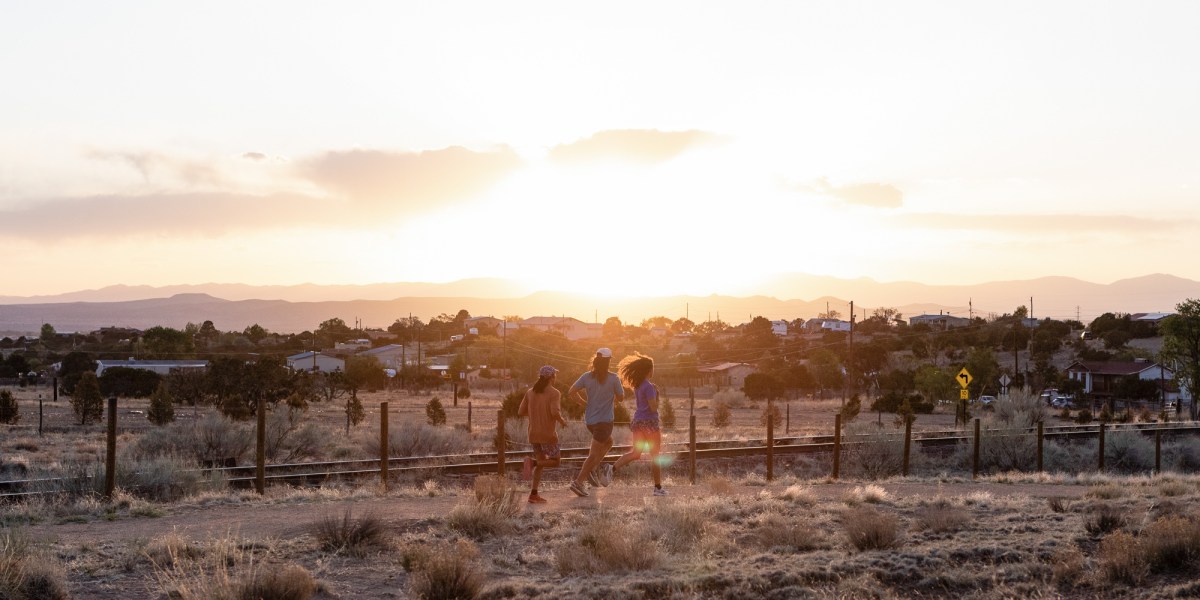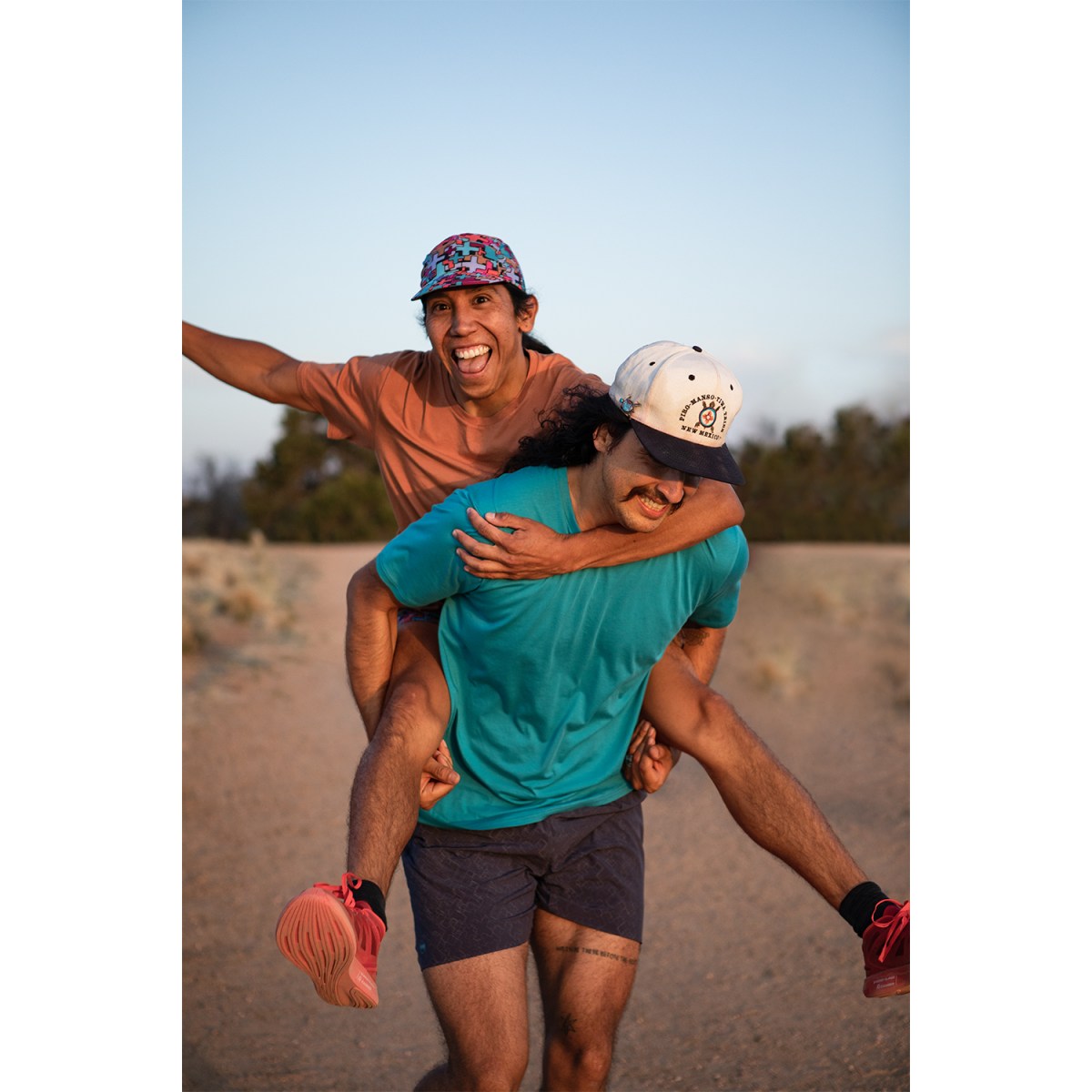Quick, name the world’s most precious resource. Oil? Nope. Gold? Not even close. “It’s water,” says 32-year-old Dave Spandorfer, co-founder of running apparel brand Janji. The data backs him up. Water isn’t a limitless resource, as 3 in 10 (2.1 billion) people currently lack access to safe drinking water and 6 in 10 do not have safely managed sanitation facilities, according to a 2019 report by UNESCO. The situation isn’t improving, and by 2030, water scarcity could displace between 24 and 700 million people.
Water is what Spandorfer and fellow Janji co-founder Mike Burnstein had in mind when a lightbulb went off on their way to their 2010 collegiate NCAA Division III Track and Field meet finals. The training partners had always known there was more to running than winning. On that eight-hour bus ride, they talked about what it would take to launch a brand inspired by what they loved most about their sport—that it offers a way to explore the world, connect with other runners and be a force for good.
A year later, the teammates secured a grant for a social impact business plan and founded Janji with the intent of transforming that vision into reality. Their goal is to expand access to safe drinking water in the places people run around the world.
“We wanted to encourage people to explore different places around the world; connect with local art and local runners in that place and tell their stories; and create change by crafting sustainable running gear with a 2% giveback of funding to clean-water solutions that are specific to that place,” Spandorfer says.
A lofty goal, but nine years later, Janji is well on its way to achieving its vision. Their model begins with selecting a region facing water scarcity. The Janji team then partners with a local artist to design a collection of running apparel that celebrates that country’s culture and chooses a local, water-related organization to receive 2% of sales from the collection. The results are making an impact.
Take Kenya, where Janji’s partnership with local nonprofit Evidence Action helped provide 25,000 people with one year of safe water. Or Peru and Bolivia, where the brand teamed up with Water For People to bring 150,000 individuals improved access to water and sanitation services. To date, the brand has donated nearly $500,000 to partners to help secure access to clean water for communities around the world.

This season, proceeds from the brand’s American Southwest line, a partnership with ultrarunner and artist Christian Gering, aims to help address water scarcity in the Southwestern United States, where conditions are dire. The region has been in a drought for much of the past eight years, according to the Environmental Protection Agency, and temperatures across most of the region rose—in some places by as much as 3 degrees—between 1901 and 2016, as reported by the most recent National Climate Assessment in 2018. “These are endemic issues that are getting worse,” Spandorfer says.
The Janji team called on 30-year-old Gering, who hails from the Pueblo community of Katishyta (Pueblo San Felipe), about 30 miles outside of Albuquerque, to design the line. The clothing features mountains, stars and lots of color—imagery Gering harkens back both to his own Pueblo roots and to the culture of Indigenous peoples across the American Southwest.
Gering was the obvious choice for the collaboration given how integral running is to his art. “Christian is not just a runner. He is a mountain runner,” Spandorfer says. “He’s about elevation. He’s about being between the Earth and the stars. It’s only natural that mountains play a role in the Janji line because they play a big role in Christian’s life.”
Indeed, Gering’s running habit involves going high, long and fast. In the last several years, he’s broken course records at the 2018 Jemez Mountain Trail Runs 50-miler and Arizona’s Javelina Jundred 100K. He finished fourth at the USA Track & Field 50-Mile Trail Championships last year, covering the distance in six hours and 56 minutes. Six months later, Gering claimed fifth at the Pikes Peak Marathon, where he completed the 13.3-mile, 7,800-foot ascent to the 14,115-foot summit in 2 hours and 29 minutes, with an overall time of three hours and 54 minutes.

Although elevation, distance and speed are the “whats” of Gering’s running career, the “whys” center more on connection (to the Earth and its people) and transformation (of the self and the world). “We are able to be grounded, rooted to the land, but we aspire and we are influenced also by our skies,” he says, noting that he appreciates that Janji, too, celebrates culture and the interrelatedness of people and place—and their preservation. “When I’m able to practice running and be in a routine of creation, I’m just reminding people of the power that is within ourselves when we put dedication, discipline and self-knowledge into practice.”
Those ideals are core to Janji, too. Its company motto is “Perpetual Forward Motion (P.F.M.),” which translates to continual improvement, with a focus on sustainability and social justice. The brand’s primary fabrics are bluesign®-approved and OEKO-TEX®-certified and one-third of its main fabrics use recycled polyester. Spandorfer and Burnstein say they care deeply about “trying to craft gear that makes you feel better, that makes you want to go on a run a little more,” Spandorfer says.
That reason for being came into sharper focus in 2018 when the brand launched the Janji Collective, a membership program with special perks like a 15% gear discount, access to a digital platform with fellow members and an invitation to attend the annual Janji retreat. Every cent of the one-time, $50 membership fee goes to supporting clean-water initiatives. Today, on top of the brand’s 2% giveback program, the collective has donated an additional $119,050 to improving clean-water access across the globe.
Despite all that, Spandorfer recognizes Janji’s efforts can only do so much. “We are a small, niche running-apparel company. We are not going to solve the world’s issues,” he says. Yet that’s no excuse not to “do our small part to make the world a little better one run at a time.”
For more stories of brands doing good work, visit our Good Gear landing page.
